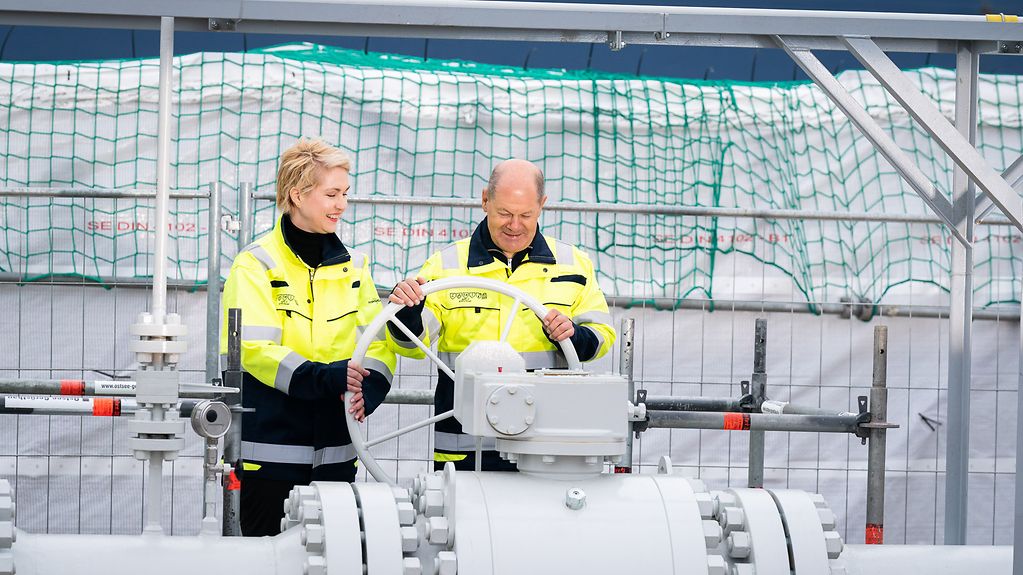Latest Liquefied Natural Gas (LNG) terminal opens
Germany's first privately funded liquefied natural gas terminal starts operations in Lubmin. "The gas supply is not affected; we can guarantee it throughout Germany, in stark contrast to what many feared for a long time," said Federal Chancellor Olaf Scholz at the opening ceremony.
2 Min. Lesedauer

Federal Chancellor Scholz and Manuela Schwesig, Minister President of Mecklenburg-Western Pomerania, at the inauguration of the LNG terminal.
Foto: Federal Government/Kugler
Another liquefied gas terminal will boost Germany's energy independence going forward. Federal Chancellor Olaf Scholz attended the inauguration of the Liquefied Natural Gas (LNG) terminal in Lubmin. Just four weeks after commissioning the first Liquefied Natural Gas (LNG) terminal in Wilhelmshaven, the next facility is now starting operations. The operator is Deutsche ReGas. According to the company, the terminal will initially supply Germany with up to 5.2 billion cubic meters of natural gas per year.
Gas prices are falling
"The gas supply is not affected; we can guarantee this throughout Germany, in stark contrast to what many feared for a long time," Federal Chancellor Olaf Scholz emphasised in Lubmin. "We'll get through this winter."
Also, he said, there was no economic crisis in Germany. "We have succeeded in stabilising the economy, not only through support programmes worth billions for citizens, workers, and businesses, but also because we have ensured that the energy supply in Germany remains secure in these difficult times.” The Federal Chancellor pointed out that gas prices on the international markets are falling, including here in Europe and Germany.
The conditions for imports have been created
The Federal Government took rapid action in the wake of the Russian invasion of Ukraine and pushed ahead with the construction of the infrastructure for liquefied natural gas imports. An import capacity in excess of 30 billion cubic metres of gas is expected to be available next December thanks to this alternative. In itself, this corresponds to over half of the total volume of gas piped from Russia to Germany in 2021. Partner countries such as Norway, the Netherlands, Belgium, and France are also supplying gas via pipelines.
To date, the Federal Government has secured five state-owned floating liquefied natural gas terminals, the first of which is already in operation in Wilhelmshaven, where another will be added in the fourth quarter of 2023. Liquefied natural gas (LNG) is also scheduled to be brought ashore at Brunsbüttel before the end of January 2023. This will be followed by state-owned terminals in Stade and Lubmin, which are scheduled to come on stream in late 2023.
European solidarity: neighbouring countries will also benefit from the new terminal
Natural gas can be piped quickly and efficiently to Germany and neighbouring countries via the newly opened private liquefied natural gas (LNG) terminal in Lubmin. Neighbouring countries, such as the Czech Republic and Austria, which have no access to the sea, are also expected to benefit from the new import options.
"Germany tempo"
It is certainly the case that the speedy development of the liquefied natural gas (LNG)infrastructure is a way of rapidly becoming independent of Russian natural gas. Right from the outset, the Federal Government has been planning on being able to use the infrastructure for hydrogen in the future. The liquefied natural gas projects (LNG), which have been implemented in record time, are examples of the new "German tempo", said Federal Chancellor Scholz.